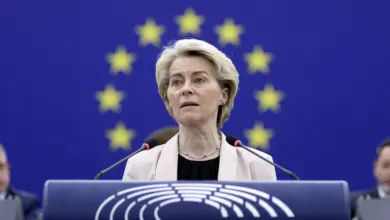
Dubbing it a farce, a joke and a delusion – Britain's largely eurosceptic press ripped into a deal to keep the country in the European Union on Wednesday, accusing Prime Minister David Cameron of selling out.
Britain's most popular newspaper, the Sun, did not mince its words, describing the deal Cameron threw his weight behind on Tuesday as "a stinking pile of manure".
The reaction underlines the battle the prime minister will have to convince those wary of the EU both inside and outside his party that the plan presented by European Council President Donald Tusk on Tuesday offered Britain the "best of both worlds".
Saying he would campaign to remain in the bloc before a membership referendum which could take place as early as June, Cameron went so far as to say if Britain was not in the EU, he would vote to join on the new terms "because these are good".
But many of the country's newspapers, which often pursue the right-wing agenda of their owners, mocked his stance, saying he had failed to tackle the two of the most important issues for voters – migration and returning powers from Brussels to London.
"Your Brussels deal has done nothing to halt migrants, nothing to win powers back for Britain," said the Sun, which is owned by one of the world's most powerful media barons, Rupert Murdoch. "Sorry prime minister, but … it stinks."
The Daily Mail also poured scorn on the deal, by saying Cameron stood accused of "delusion and selling the country short", while the more centrist Financial Times said the British leader faced a battle to sell the plan to his own lawmakers.
Britons are split over EU membership and, while opinion polls have shown that Cameron's support of the 'in' campaign may boost the numbers wanting to remain, it is clear he faces a struggle against a largely hostile press.
Cameron will address parliament later on Wednesday, where he will face tough questions from British lawmakers, including eurosceptics from his ruling Conservative Party who have not been shy about criticizing it. One of them, former Defense Secretary Liam Fox, said the deal was little more than "empty promises".
Cameron will also have to convince some of the ministers now serving in his cabinet, who have indicated in the past that they may campaign to leave the 28-member bloc.




